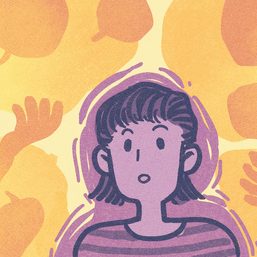SUMMARY
This is AI generated summarization, which may have errors. For context, always refer to the full article.
![[OPINION] In defense of reading self-help books](https://www.rappler.com/tachyon/2021/10/rappler-blogs-shutterstock-self-help-books-sq.jpg)
Picture this: You just finished a self-help book that made you feel motivated the past few days. Basking in the afterglow, you go to Goodreads, ready to give it a solid 5 stars and go about living an invigorated life. And then you see a sprinkling of 1-star, strongly-worded reviews from people who hate it with passion.
It’s one of those “oh” moments. You go through these bad reviews and suddenly you question what you thought and felt about the book you’ve just read and loved. Are we really talking about the same book?
But then you come to understand where they’re coming from, point by scathing point.
Reading, for me, is a deeply personal experience. How you react to a book (or to anything really) depends on so many factors other than its contents.
It depends on where you are in your life right now: Are you struggling? Are you at a crossroads? Are you successful or on the cusp of being one? It depends on how you feel: Are you happy? Are you lonely? Are you vulnerable? Are you open? Are you easily triggered?
It depends on your goals: Do you want to get out of a rut? Do you want to start over? Or are you just looking for a nudge? It also depends on what you’re looking for: Are you looking for specific, step-by-step solutions? Or are you just looking for affirmation?
In an ideal world, every self-help book we pick up would be the antidote to whatever it is that we’re feeling. But the reality is, whenever someone does something, self-help authors included, they do it with a certain category of audience in mind. And that doesn’t always include you and me.
This piece, for example, I’m writing this for people who keep on finding themselves disappointed in the self-help books they pick up. Those who end up feeling upset and much worse than they were before reading a book they thought would help them. I love reading and it’s sad to hear people not being able to enjoy it. So, if you’re not one of those, this article might disappoint you, too, and you might even disagree with it, and that’s okay.
I understand that books don’t come with specific instructions on who they are for and who should avoid it. That’s why apart from doing our research and reading reviews about books we’re planning to buy and read, we should also do our own self-introspection. Before checking out, let’s try to answer similar questions that were posed above.
I myself have read a couple of self-help books that I didn’t like. So much so that I avoided reading this genre for a while. Like what so many people would say, self-help books sound repetitive. They take existing concepts, regurgitate them, and package them in a different way.
But when I got engaged, I felt I needed to go back to reading self-help books to prepare for marriage. I didn’t have to force myself. I gravitated towards it.
This time, knowing how I felt about self-help books and books in general, I did my research and then coupled it with introspection. I knew I wanted books about marriage but I also knew what kind of marriage I wanted to have. So even if a certain book about “always letting the husband have his way” appeared in articles about “books you should read before getting married,” then I didn’t pick that up. If I did, then I’ll be disappointed and spiteful of the author. I would have wasted my money and time.
Right now, I’m still on the self-help boat because I know that’s where I can be and need to be. I want to learn how to draw and paint, I want to learn how to manage my time so I can draw and paint considering I have a full-time job, I want to discover my art style, I want to learn how to write better. Then I want to learn how to gain the confidence to do all that, and get the final nudge that I need to actually start doing.
The books I’m reading now belong to a wide spectrum – from technical, step-by-step books to ones that give affirmation and boost confidence. My list includes popular self-help books with polarizing reviews like Atomic Habits by James Clear, a couple of books by Ryan Holiday, and some obscure technical books on business, drawing, and anatomy. Some of these books, controversial as they are, were recommended by friends I trust and whose lives inspire me. That to me is better than any reading list or Goodreads review.
The reality of self-help books
I acknowledge that I am also in a place of privilege, a position I wasn’t in before when I started seeing some self-help books as distasteful. It’s important to acknowledge this because not all people have the tools, time, energy, money, resources, headspace, and patience to follow the steps that a person with a different background and privileges has taken. I should know, I was one of those people before. Some people need a different kind of help, an actual, more tangible one so they could live a better life.
So, let’s be clear that we are not prescribing self-help books to those who are in need of a different kind of support. But if you’re fortunate enough to be in the position where you can look to self-help books for guidance, then let’s make the most out of it and use it to help others, too.
I’m not here to defend self-help books, especially the truly crappy ones. By all means, go ahead and give your bad review. They deserve to hear your constructive criticism. But hopefully not at your expense. It’s one thing to warn people about a bad book you’ve just read, upsetting yourself in the process is another.
I’m here to defend the joy of reading to help ourselves.
Reading a book that ends up doesn’t serving you could definitely feel frustrating. You invest money, time, and emotions in each book – precious resources that of course you would expect would give you some form of returns.
That’s why it’s important to be careful and intentional about choosing the self-help books we read. Ask the people you trust about the books that changed their lives because they might not always be the ones on the bestsellers list.
And if you find a self-help book that doesn’t live up to your expectations, just take what you can. Use it as a springboard to the kind of book you should read next. You may not have learned something groundbreaking from the book but at least you’ve learned a little something about yourself, even if it’s as simple as discovering one thing that you don’t like. That’s a form of self-help, too, right? – Rappler.com
Add a comment
How does this make you feel?


![[OPINION] LGBT, mental health, and why Pride March is there](https://www.rappler.com/tachyon/2024/06/lgbt-mental-health-june-11-2024.jpg?resize=257%2C257&crop_strategy=attention)
![[Free to disagree] Ending victimhood](https://www.rappler.com/tachyon/2024/05/TL-Ending-victimhood-May-20-2024.jpg?resize=257%2C257&crop_strategy=attention)

![[DETOURS] Let me wear that red lipstick](https://www.rappler.com/tachyon/2021/05/detours-make-up-April-21-2021-sq.jpg?resize=257%2C257&crop_strategy=attention)



There are no comments yet. Add your comment to start the conversation.